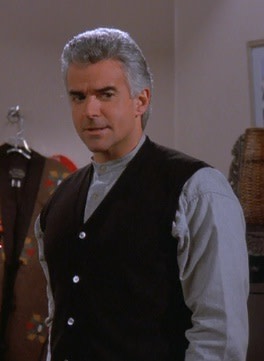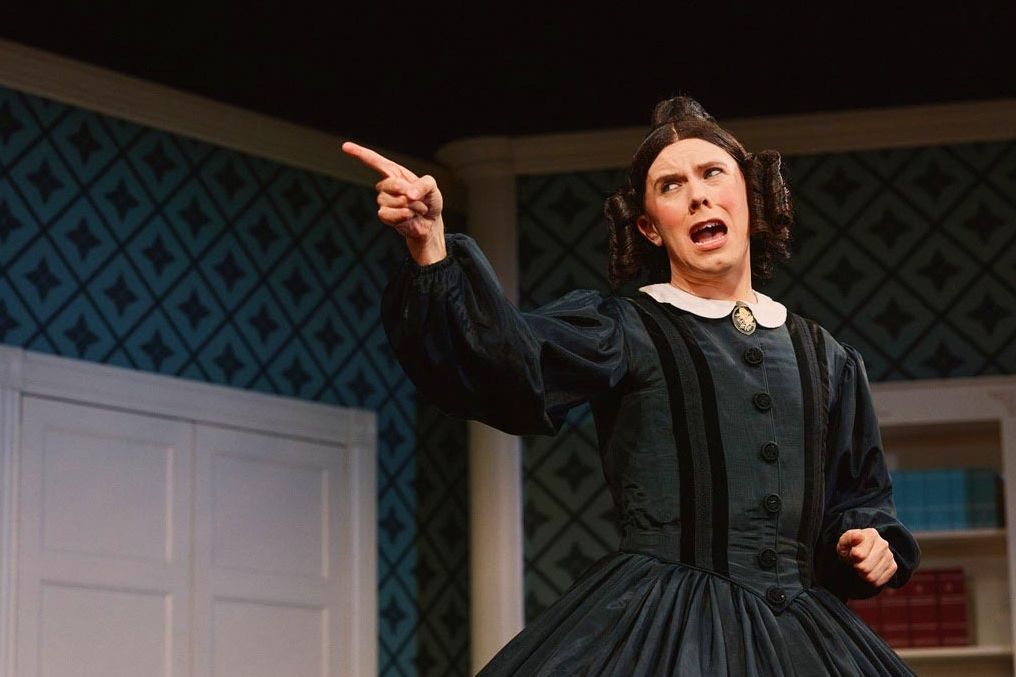Q&A: John O'Hurley (a.k.a. Seinfeld's J. Peterman)

When it comes to John O’Hurley and J. Peterman, it’s hard not to conflate actor and role. After all, O’Hurley is as strongly identified with Peterman, the recurring character he played on Seinfeld from 1995 to 1998, as any actor is with a part. His blustery performance as the globetrotting catalog-company owner (based on the real-life head of the J. Peterman Company) made him a favorite of the show’s fans.
But though he possesses a similarly booming voice, O’Hurley isn’t Peterman. After Seinfeld ended, the multitalented entertainer left his best-known role behind for a remarkably diversified career that has included hosting Family Feud, appearing on Dancing with the Stars, and putting out two albums of original piano compositions. He’s hosted the nationally televised National Dog Show every year since 2002 and has authored two books of dog-inspired life lessons (sample title: Before Your Dog Can Eat Your Homework, First You Have to Do It). He’s even dabbled in postmodern investing, buying a stake in the real J. Peterman Company when it emerged from bankruptcy in the early aughts.
O’Hurley, a longtime stage actor and classically trained singer, has also been performing in numerous musical productions—most notably as Billy Flynn in the Broadway revival and national tour of Chicago. The hit show—it’s the longest-running American musical in Broadway history—passes through Portland September 3 to September 8. O’Hurley sat down with Culturephile in the Benson Hotel lobby to talk about why the Tony-winning satire is better than the movie (and why his Flynn is better than Richard Gere’s), as well as about life after Peterman.
Have you been to Portland before?
Many times. Mostly golf-related, because there are a lot of tournaments up here. [Portland-born professional golfer] Peter Jacobsen is a dear friend of mine, and he used to have a tournament here called the Fred Meyer Challenge; I played in that for many, many years. There are three things I like to do here: number one is golf; number two is, I’m a fly fisherman, so I love to come up here and fish; and number three is, I’m a wine collector, so the entire Pacific Northwest is very interesting to me.
Has it been hard, in your career, to get past the J. Peterman character?
No, because I have such a diversity of things that I do. I think people would rather see me not play Peterman, because they’ve seen Peterman before. They associate it with that show and they kind of want it kept there.
I always look at it as kind of the day the music died when that show went off the air. What I loved about Seinfeld was, the characters were so over the top that it all worked. J. Peterman was so over the top, he wouldn’t fit on any other show. It was such an enjoyable role to play for that reason: you could basically chew the scenery and nothing was too outrageous.
Why did you help finance the relaunch of the real J. Peterman Company?
It was a good investment. I know the company; John Peterman and I became very close friends during the run of Seinfeld, since I basically ripped his life off. When the company went through financial difficulties in late ‘98, he called me and said, “You want to put the company back together from our parallel strengths?” And I said, “Absolutely. Let’s do it.” I’ve been on the board ever since.
What’s your background in musical theater?
I grew up thinking I had a great voice, until somebody told me at the age of 12 I had the worst voice they had ever heard. So I never sang again until college. Then, the head of the music department at Providence College, where I went, said, “I know you have a voice in there; I’m going to pull it out of you,” and he did. That’s when I really focused on my musical training. All my training was operatic. I started off in opera, basically, in New York, and then went from there to Broadway.
How about your dancing background?
I took a couple years of ballet, just movement classes and stuff like that, but I have no formal dancing training at all. [Competing on] Dancing with the Stars was not working from my strengths, nor was wearing spandex when you’re 50 years old.
What attracted you to the role of Billy Flynn?
He’s one of the two great leading men I can play in musical theater. One is Billy Flynn and the other is King Arthur, in [Monty Python’s] Spamalot. You work from your strengths. They represent the two things I do well: one is silly, and the other is elegance. I’ve cornered the market on both of those. King Arthur is J. Peterman, just 1,000 years removed.
Billy Flynn I like because he’s elegant and dangerous, and I like the two aspects of the character. What makes the Billy Flynn I play a little different is that I add in a paternalistic quality, so that as long as he’s onstage, you know you’re taken care of. It’s the essence of any good leading man: the instant he walks onstage, you know he’ll take you through.
What should people who haven’t seen the stage version of Chicago expect?
It is one of the most compelling shows you’ll ever see. There’s no set, and the orchestra is right in the middle of the stage. Everything is created in your imagination. It is the best music John Kander ever wrote, and it is the best choreography Bob Fosse ever put on stage.
Has it been difficult to fill Richard Gere's shoes? [Gere played Flynn in the movie version of Chicago.]
He was OK. I mean, he’s not a stage actor, so he can’t command. I think he was a little soft; you could tell he was uncomfortable singing. He was a little more understated with it than I’ve chosen to be. But he did a nice job with it, and the movie, the whole thing together, is as good as you can do with a Broadway show. And I think it has helped our box office.
Chicago
Sep 3–8
Keller Auditorium Do you prefer stage work over screen work, or do you like having a foot in each world?
Listen, I’m a corporation with five operating branches. I’m writing a new book. I still host things like the [National] Dog Show. I’ve got new albums. I do a lot of motivational speaking for corporations now. I have a lot of television ahead this year. So, I keep everything going. It’s tough to hit a moving target.




